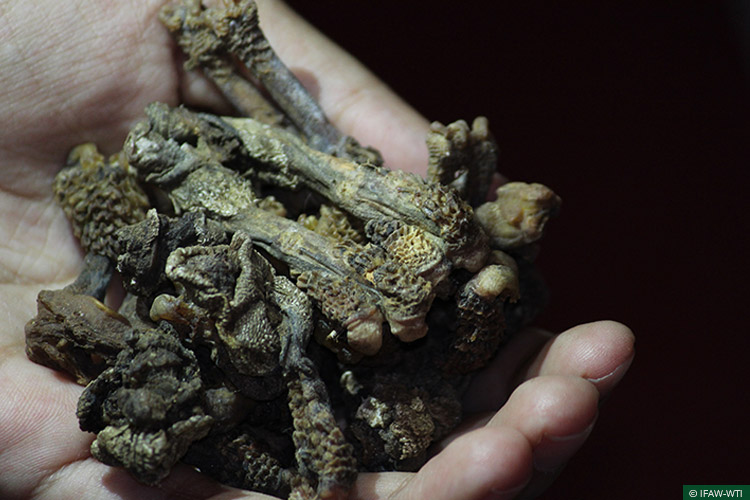New Delhi, India, June 21, 2017: Superstition, deceit, greed and cruelty underlie the strange story of Hatha Jodi (also known as Hath Jod, literally translating to ‘clasped hands’) — a ‘rare plant root’ that vaguely resembles two hands clasped in prayer, and which is misrepresented by unscrupulous holy men and occult practitioners as being a powerful charm capable of bringing prosperity and good fortune to its possessor.
This sacred ‘root’, however, belongs to no plant: it is the bifurcated penis (also known as a hemipenis) of any of four species of monitor lizards found in India, all of which are protected under Schedule I of the Indian Wild Life (Protection) Act of 1972 and listed on Appendix 1 of the Convention on International Trade in Endangered Species (CITES), which prohibits the import or export of the animal or its body parts.
Hatha Jodi, in its guise as a rare root, is sold openly on prominent e-commerce websites such as Amazon, Flipkart, Snapdeal and IndiaMart among others
An undercover investigation conducted by Wildlife Trust of India (WTI) and the International Fund for Animal Welfare (IFAW) in association with the Indian government’s Wildlife Crime Control Bureau (WCCB) has revealed that the trade in this banned wildlife product is rampant across the country and internationally. Hatha Jodi, in its guise as a rare root, is sold openly on prominent e-commerce websites such as Amazon, Flipkart, Snapdeal, IndiaMart and Locanto among others. There are in addition several websites that have been set up with the express purpose of peddling this item, some of them providing intricate descriptions of rituals required to derive the maximum benefit from its use. Numerous YouTube videos that feature so-called holy men eulogising Hatha Jodi have also doubtless led credulous and desperate buyers to purchase the product, unaware of its true nature.

And of its true nature there is no doubt. After initial investigations, a sample recovered by the IFAW-WTI investigative team was sent to the Centre for Cellular and Molecular Biology, Hyderabad, for testing – whereupon it was confirmed that it was indeed a monitor lizard penis. The sellers in most cases were aware of the product’s origins, telling the undercover agent to be careful about transporting it outside India while suggesting ways in which this could be managed.
So how does Hatha Jodi come to be? Both male and female Bengal monitors are picked up indiscriminately from the wild – both sexes are useful for their meat, fat and skin after all — even though the males’ hemipenises are the sought after items. The males are then burned alive so that their penises protrude further from their bodies, following which the penises are extracted and sun-dried, and are ready to be sold as sacred ‘roots’.
 The male monitor lizard is hunted, its hemipenis is extracted, and the sun-dried organ is sold as a sacred root
The male monitor lizard is hunted, its hemipenis is extracted, and the sun-dried organ is sold as a sacred root
A sample of hatha jodi recovered by the investigative team was confirmed through laboratory testing to be a monitor lizard penis.
Traders use secure payment transaction platforms to transfer money directly to their bank accounts. The price of the original Hatha Jodi varies from INR 500 – 6000, though interestingly the investigative team came across a number of duplicate products made of plastic, wheat flour and Plaster of Paris that were being sold at much cheaper rates. Established online sellers usually charge a premium and make arrangements for the product’s transport, within India or internationally.
Traders confirmed to IFAW-WTI’s covert team that there are several non-Indian buyers who believe in Hatha Jodi’s potency. Indeed, the fantasy spun by the traders and so-called spiritual gurus is so strong that several enforcement officials and conservationists involved in the investigation found it hard to believe that the mythical root was nothing more than a lizard’s penis.
Following the investigation, WCCB has issued a national level alert to all Chief Wildlife Wardens and state forest departments across India.